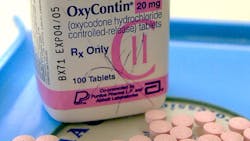A small city on January 19 filed a lawsuit against Purdue Pharma, the maker of the pain reliever OxyContin, accusing the company of helping fuel an opioid crisis that has devastated the town.
"There is clear evidence that Purdue ignored their responsibility to stop the diversion of OxyContin into the black market, directly leading to the heroin crisis on our streets today," Ray Stephanson, the mayor of Everett, Washington, said in announcing the suit.
"Their drive for profit caused this epidemic, which has overwhelmed our treatment and emergency systems."
The first-of-its-kind civil suit asks that the drugmaker be made to pay the costs of handling the crisis as well as punitive damages.
The Conn.-based drug firm has previously been accused of misleading doctors and patients about the addictive nature of OxyContin, a prescription drug that often leads to heroin abuse. The company agreed to pay more than $600 million in fines in 2007 for minimizing the risks of its blockbuster pain reliever pill.
The suit filed by city officials in Everett, which has a little over 100,000 residents, accuses Purdue of allowing OxyContin to flood the city's streets in total disregard for the community's wellbeing.
"Purdue placed profit over the health and safety of our community, and we can see the tragic results of that decision throughout Everett," Stephanson said. "We've already invested significant taxpayer dollars to deal with impacts of opioid addiction in our city, and we know that substantial additional resources will be needed to deal with this crisis in the coming years."
City Overwhelmed
City officials said the epidemic is affecting residents from all walks of life.
"We only have a 16-bed detox center in our county right now... but on any given day we have 10 times that many people detoxing in our jail," city spokeswoman Meghan Pembroke said. "The scope of the problem is so big that without additional resources, we don't feel like we're going to make significant progress."
A representative for Purdue said that the company shared public officials' concerns about the opioid crisis and was committed to help find solutions.
"Although OxyContin accounts for only two percent of all pain-related opioid prescriptions, Purdue is an industry leader in abuse deterrence as we were the first pharmaceutical company to develop an opioid medication with abuse-deterrent properties," Bob Josephson said.
The long-term painkiller drug first went on the market in 1996. The company touted its positive effects in a 1998 promotional video titled "I Got My Life Back."
In a bid to curb abuse, Purdue in 2010 introduced a new version of the drug that makes it harder for drug abusers to crush the pill to snort or inject.
According to the Centers for Disease Control and Prevention, deaths involving prescription opioids have quadrupled since 1999 along with sales of such prescription drugs.
More than 183,000 people died in the United States from overdoses related to prescription opioids including OxyContin between 1999 and 2015, according to the CDC.
Copyright Agence France-Presse, 2017
About the Author
Agence France-Presse
Copyright Agence France-Presse, 2002-2025. AFP text, photos, graphics and logos shall not be reproduced, published, broadcast, rewritten for broadcast or publication or redistributed directly or indirectly in any medium. AFP shall not be held liable for any delays, inaccuracies, errors or omissions in any AFP content, or for any actions taken in consequence.
